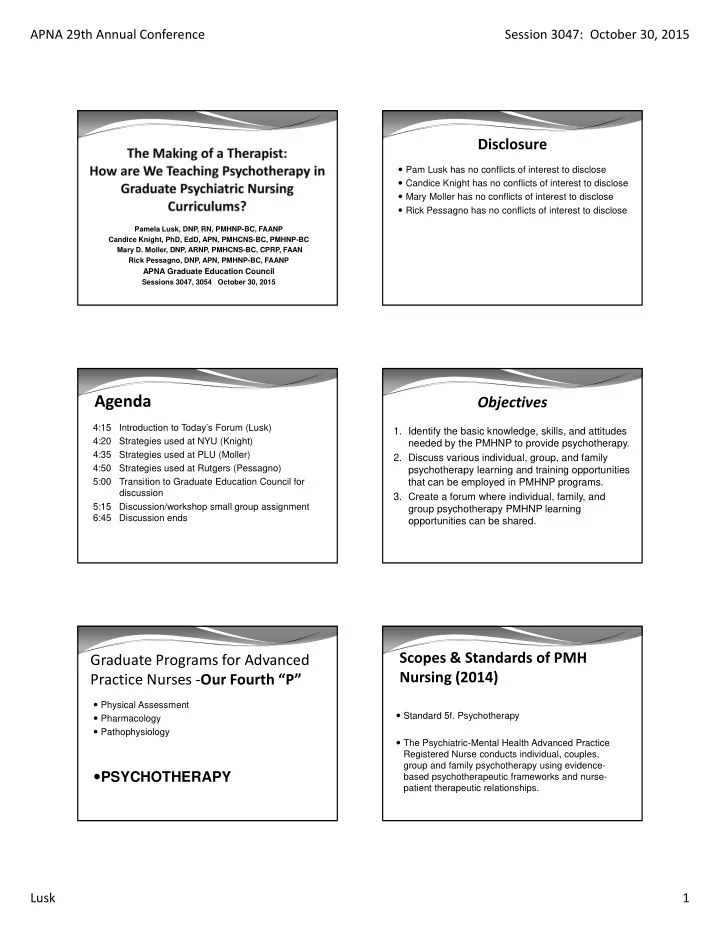

APNA 29th Annual Conference Session 3047: October 30, 2015 Disclosure Pam Lusk has no conflicts of interest to disclose Candice Knight has no conflicts of interest to disclose Mary Moller has no conflicts of interest to disclose Rick Pessagno has no conflicts of interest to disclose Pamela Lusk, DNP, RN, PMHNP-BC, FAANP Candice Knight, PhD, EdD, APN, PMHCNS-BC, PMHNP-BC Mary D. Moller, DNP, ARNP, PMHCNS-BC, CPRP, FAAN Rick Pessagno, DNP, APN, PMHNP-BC, FAANP APNA Graduate Education Council Sessions 3047, 3054 October 30, 2015 Agenda Objectives 4:15 Introduction to Today’s Forum (Lusk) 1. Identify the basic knowledge, skills, and attitudes 4:20 Strategies used at NYU (Knight) needed by the PMHNP to provide psychotherapy. 4:35 Strategies used at PLU (Moller) 2. Discuss various individual, group, and family 4:50 Strategies used at Rutgers (Pessagno) psychotherapy learning and training opportunities 5:00 Transition to Graduate Education Council for that can be employed in PMHNP programs. discussion 3. Create a forum where individual, family, and 5:15 Discussion/workshop small group assignment group psychotherapy PMHNP learning 6:45 Discussion ends opportunities can be shared. Scopes & Standards of PMH Graduate Programs for Advanced Nursing (2014) Practice Nurses ‐ Our Fourth “P” Physical Assessment Standard 5f. Psychotherapy Pharmacology Pathophysiology The Psychiatric-Mental Health Advanced Practice Registered Nurse conducts individual, couples, group and family psychotherapy using evidence- PSYCHOTHERAPY based psychotherapeutic frameworks and nurse- patient therapeutic relationships. Lusk 1
APNA 29th Annual Conference Session 3047: October 30, 2015 Psychotherapy in the Past Peplau Mental Health Care System 1956 Report form National Working Emphasis on psychosocial models Conference on Graduate Education in Psychiatric Nursing (NLN & NIMH). Availability of mental health funding “The Education of the Clinical Specialist Abundant time to practice & process cases in Psychiatric Nursing: Graduate PMH Advanced Practice Peplau had begun to differentiate the Programs clinical specialist as a psychiatric nurse prepared at the master’s level Hildegard Peplau’s interpersonal model who concentrated on the Focus on individual, group, & family therapy psychotherapeutic role of the nurse. Longer psychotherapy theory & clinical hours (Anderson, 1995, p 79). Expert supervision in psychotherapy So What Now Is Needed? Current Influences: Psychotherapy Mental Health Care System What are the basic Emphasis on biological model knowledge, skills, and Managed care – focus on medication management attitudes needed by Split treatment the PMHNP to provide Quick-fix consumers psychotherapy? Graduate PMH Advanced Practice Programs Less curriculum time for psychotherapy courses Reduced clinical hours Less faculty & preceptor psychotherapy expertise Time constraints in clinical agencies Knowledge Skills Ability to develop rapport and trust Professional and ethical guidelines Adapting interpersonal style and structure to suit the Psychopathology client Common factors research Ability to conduct diagnostic assessment Foundational knowledge in basic theoretical General case conceptualization skills orientation Treatment planning Assessment and diagnosis Risk assessment/ management Knowledge of basic science, evidence-based Report writing practice Lusk 2
APNA 29th Annual Conference Session 3047: October 30, 2015 Attitudes Accurate empathy Compassion Sensitivity to individual differences Candice Knight Genuineness Lifelong learning (Roth & Piling 2007, 2008) Essential Psychotherapy Content Essential Psychotherapy Content Common Factors (Elements of Effective Therapy), depth Common Schools of Therapy and Major Subtypes, breadth Factors Developing “Toolbox Skills” Identifying & Developing a Conceptual Framework Schools, Subtypes Depth Special Topics: Ethics, research, special populations Psychotherapies Toolbox Skills Depth Psychotherapy Group Therapy, depth Couple and Family Therapy, depth Behavioral Therapy (CBT), depth ID & Dev Integration of Cognitive Therapy (CBT), depth Theoretical Therapy & Meds Dialectical Behavior Therapy (DBT), depth Orientation Play Therapy, depth History, Motivational Interviewing, depth Ethics, Emotion-Focused Therapy (EFT), depth Research Content – Course #1: Content – Course #1: Individual Psychotherapy Individual Psychotherapy Tool Box Skills (Experiential Training) Common Factors and Developing a Theoretical Orientation, depth Behavioral Common Factors & Theor Orient Interpersonal skills & forming an alliance Empathic understanding Stress mngt (breathing/prog rel) Psychodynamic, breadth Facilitative listening, presence Systematic desensitization Developing the narrative Classical, Interpersonal, Ego, Object Relations, Self, Individual, Brief Cognitive Selecting direction/choice points Humanistic-Existential, breadth Cognitive restructuring Pacing and timing Person-Centered, Gestalt, Existential, Emotion-Focused Id & developing a theor orient Thought stopping Behavioral, breadth Psychoanalytic Postmodern Interpretation Classical & Operant Conditioning, Stress Mgmt, Syst Desensitization Miracle question Free association Cognitive, breadth Transforming the story Transference, Information Processing, REBT (Ellis), Cognitive (Beck) Empowering the client countertransference, resistance Post-Modern, breadth Life recollection review Integrative Humanistic-Existential Solution-Focused, Narrative, Feminist ID ambivalence, change talk Awareness and focusing Integrative, breadth Rating intensity of discomfort Here-and-now Motivational Interviewing, EMDR, DBT, Schema Distress tolerance skills Process Lusk 3
Recommend
More recommend